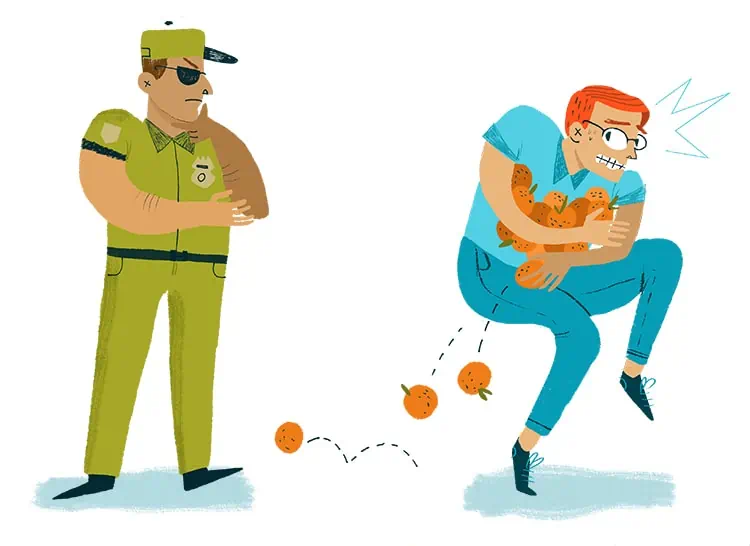Ah, California! Land of vast national parks and long sandy beaches. Cradle of Hollywood dreams and Silicon Valley riches. With all the Golden State offers, it’s no wonder close to 40 million people have come to call California home.
But more than a haven for fun, fame and fortune, California boasts a GDP larger than most countries, grounded in an agriculture industry that generates tens of billions of dollars of revenue annually.
Protecting it all are officers at the sixteen checkpoint stations along the state line, stopping vehicles and confiscating animals, plants, and many other things that can harm the landscape and the people who live here.
So before you pack up and head for your new home and California dream, it’s really important to check what you can and can’t bring with you. And once you’re an expert on it, you can cruise across the border without worry, knowing you’re doing your part to keep California healthy and prosperous.
Pets, Livestock, and Other Animals
Bringing common household pets into California is no problem! Cat owners in particular have it easy: the California Department of Public Health (CDPH) doesn’t require any documentation for domestic felines. Dogs, on the other hand, require proof of rabies vaccination — but nothing else.
For most other critters, the California Department of Fish and Wildlife (DFW) offers an impressive list of animals that can not be imported into the state. The DFW also offers information on restricted species. If you aren’t sure where your iguana stands, check directly with the authorities in the specific region where your new home is located.
“…[T]he AG requires that you as a gun owner do one of three things within sixty days of moving to California: register your firearm, sell it to a licensed dealer…or sell it to the police or sheriff’s department.”
And for all you farmers and ranchers out there, the California Department of Food and Agriculture has information on importing livestock and poultry.
Licensing your dog or cat in California once you’ve moved in is mandated and enforced locally. Check with your city or county for your specific required actions – preferably before you arrive.
Alcohol, Marijuana, and Other Cannabis Products
As long as you are 21 or older, you are permitted to bring alcoholic beverages into California provided it is for personal or household use. Transporting alcohol into the state for commercial or business purposes requires a license from the Department of Alcoholic Beverage Control (ABC).
Persons 21 and older are also legally permitted to possess and use marijuana within the limits of state and local laws.
However, under current federal law it is illegal to transport marijuana across state lines. So as you peruse California’s laws regarding using, growing, and keeping marijuana in your car, understand that this only applies once you are in-state. Bring your leftover Budweiser when you move, but leave the bud behind.
Here’s $25 Off Movers

Open Container Laws
Article 2 Section 23223(a) of California’s State Vehicle Code states it is illegal for any person operating a motor vehicle on California’s highways or public roads to have in their possession “any bottle, can, or other receptacle, containing any alcoholic beverage that has been opened, or a seal broken, or the contents of which have been partially removed.” The same goes for any passenger, as stated in 23223(b).
Section 23225 states that the above may not be kept in a vehicle unless it is in the trunk, or out of reach if there is no trunk, or inside a locked container as a last resort. The same rules apply to cannabis, as stated in Section 23222.
All the detailed laws can be found right here, starting with the rather obvious “no drinking or smoking weed by any driver or passenger” law of Section 23220.
Plants and Produce
California is right to be protective of its $60 billion agricultural industry. An outbreak of invasive insects and pests could wreak havoc on the economy and disrupt the supply of fruits and vegetables all across the country. So the California Department of Food and Agriculture (CDFA) is not shy about stopping potential disasters at the border.
Houseplants are generally not prohibited, as long as they are potted in commercially sold soil and not dirt from your old backyard. If a plant shows any sign of infestation or disease, however, it will quickly be confiscated. For more detailed guidelines check out this Q&A by the CDFA.
Notice that the first question focuses on what is not allowed, and the answer says all citrus plants. It may sound strange, but California is particularly serious about barring all citrus, including loose pieces of citrus fruit, from being brought into the state. Many other fruits, as well as a number of nuts and vegetables, are also prohibited. This extensive list by the CDFA lays out all the fun and surprises.
Firearms and Weapons
Make of it what you will, but California is tougher on huckleberries than they are on handguns. As California’s Attorney General states regarding firearms information for new California residents:
Any person transporting handguns into California is required under California law to transport those handguns unloaded and in a locked container other than the glove compartment or utility compartment of a vehicle.
In addition, the AG requires that you as a gun owner do one of three things within sixty days of moving to California: register your firearm, sell it to a licensed dealer (or to a third party through a licensed dealer), or sell it to the police or sheriff’s department.
While there is no specific mention of the legality of bringing shotguns or rifles into the state, under the Transporting Firearms in California section, the AG explains that these non-concealable firearms are not required to be transported in a locked container, but must be unloaded while in transit.
“…[A]s you peruse California’s laws regarding using, growing, and keeping marijuana in your car, understand that this only applies once you are in-state.”
In addition, the California Attorney General lays out in great detail all sorts of assault weapon laws and regulations. Unlike firearms (and much more like huckleberries), California “generally prohibits” a wide variety of weapons. California Penal Code 16590 lists nunchucks, cane swords, and lipstick case knives among the wide array of weapons that, if you have them, can land you in hot water.
The process – and sometimes the long wait – at California’s border stations can seem like an unnecessary hassle. But hey, this one state produces a third of the country’s vegetables and three quarters of the its fruits and nuts. It makes sense for them to be tough.
Doing your part when you move to California makes the officers’ jobs, and the long lines, a little easier to take.






